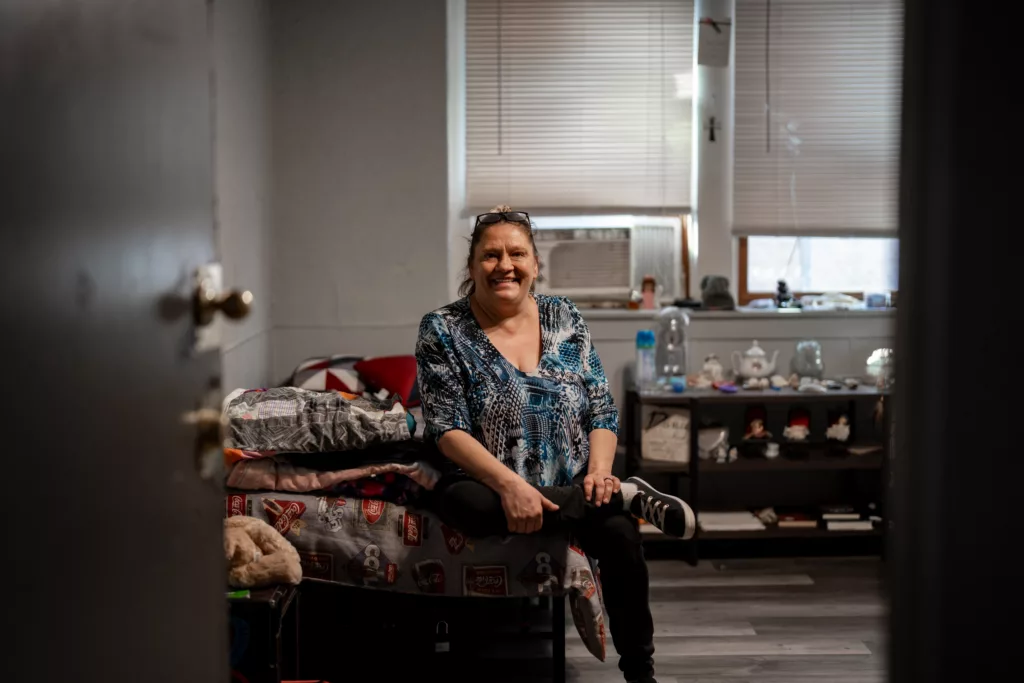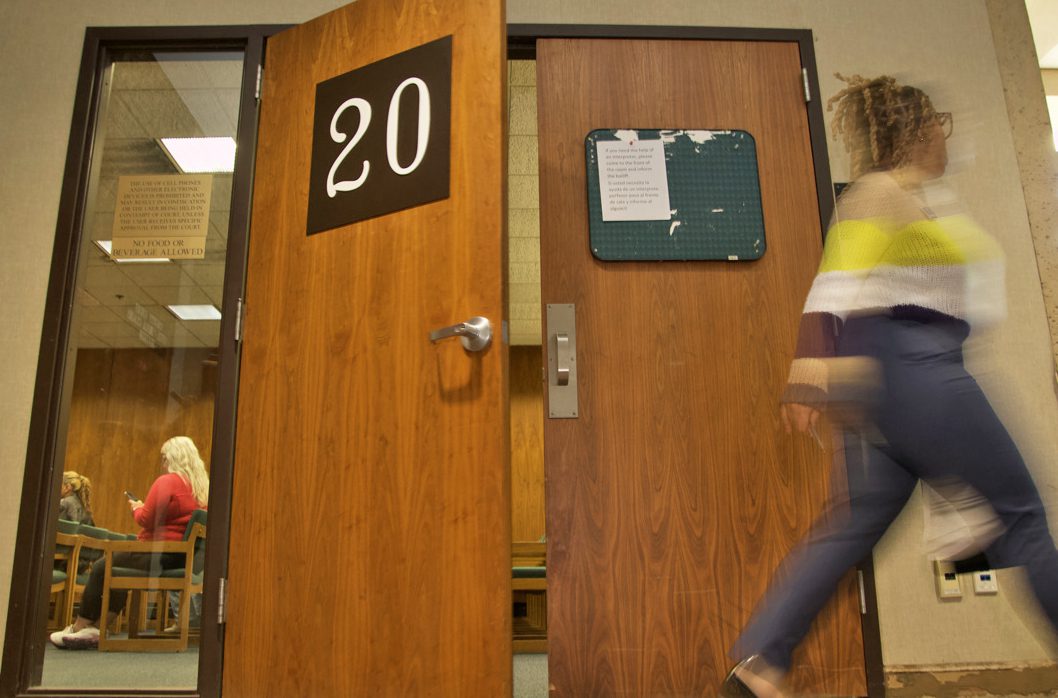As Bob Peniska rolled out the doors of Douglas County court, he asked himself a question familiar to many public housing tenants leaving eviction proceedings: Where will I go now?
After nearly a decade at Benson Tower, the Omaha Housing Authority wanted him out. The lifelong Omahan, who is missing his left foot and uses a motorized wheelchair, knew his options were limited.
About a week after he left his apartment to comply with an agreement reached in court, Peniska pitched a worn blue tent near a Casey’s gas station in Carter Lake, Iowa.
For the next 17 nights, he hunkered down in a sleeping bag and watched TV on his phone to help him nod off. During the days, he charged his wheelchair inside the convenience store when the manager wasn’t running him out.
“I ain’t never lived like this,” Peniska said. “I’ll take a closet, man. I just need a room.”
Omaha’s public housing residents have faced the threat of eviction more often this year than any year since 2017.
Their landlord, OHA, has filed to evict tenants more than 400 times this year — 85% of the time over money allegedly owed by tenants.
A handful of tenants received eviction notices for amounts comparable to dinner at a restaurant: $35, $60, $75. In all, OHA filed to evict more than four dozen tenants who owed less than $300, according to a Flatwater Free Press analysis of court records. Legal fees imposed by the agency more than doubled their debts in many cases.
These are among the findings in this first of several stories on OHA, one of Nebraska’s largest landlords.
Tenant advocates say OHA’s eviction practices conflict with the federally funded agency’s mission to provide subsidized housing to the poorest and often most vulnerable renters.
“Public housing exists because there is a need,” said North Omaha community activist Cheryl Weston. “If you’re not going to provide that, don’t get into it. Get out of it.”
OHA management says the agency is bound by financial realities and federal regulations that require tenants, including the poorest who pay little in rent and often face small-dollar evictions, be treated the same. The uptick in eviction filings is unavoidable, they say.
“We’re here because we care about who we’re serving and how we serve them,” said OHA CEO Joanie Poore. “We’re trying to do that while still complying with the rules and regulations that we have.”
Bills to pay
Shortly after 9 a.m. on Halloween, Douglas County Judge Marcena Hendrix began reading aloud the names of cases on the eviction docket.
More than two-thirds of the 31 cases came from OHA.
Before 2020, Omaha’s eviction court ran with unsparing efficiency. Few tenants had lawyers and many didn’t show up to court, said attorney Dave Pantos.
But the COVID-19 pandemic spurred federal, state and local policies and programs to keep renters in their homes – and it largely succeeded.
Omaha tenants started receiving free legal representation, and over $90 million in federal rent assistance flowed to the city’s landlords from 2021 to 2023, according to the Metro Area Continuum of Care for the Homeless (MACCH).
Those funds dried up in August.
Eviction filings are up across Douglas County this year, but housing advocates are particularly worried by the sharp increase in OHA filings given the vulnerability of public housing tenants.
The agency’s tenants are disproportionately people of color, single-parent families and people with disabilities, according to Department of Housing and Urban Development data from 2022. The average annual income of an OHA household: roughly $14,000.
OHA eviction filings reached a six-year high this year, and they’re up more than 60% over the agency’s annual average during the pandemic.
OHA administrators say the agency’s finances and federal rent collection guidelines drive the need to file eviction notices against tenants who haven’t paid rent.
Rent accounts for 8% of the agency’s total projected revenue, according to its 2023 budget.
“If we don’t get money owed, we don’t have money to pay our bills,” said OHA Director of Operations Jody Holston.
OHA also files eviction notices as a way to communicate with hard-to-reach tenants who are behind on rent, said OHA attorney Brian Hansen.
Poore said the main reason for the increase is that OHA is trying to be more consistent in applying its eviction-related policies.

Prior to her arrival in 2019, nine different property managers decided which cases to refer for eviction, she said. Now, the agency’s legal team and property managers generally file for eviction if a tenant fails to pay rent for three months or racks up a $600 debt.
Hansen noted that the pandemic-era rental aid created a false expectation among tenants that they could show up to eviction court and get a nonprofit to pay off their debts.
OHA’s administrators contend that most of the agency’s eviction filings don’t lead to actual evictions. But many tenants end up leaving their units under court-approved deals that require them to move out if they can’t quickly pay their debts. The agency said it doesn’t track how often this happens.
Housing advocates, locally and nationally, say the agency’s tendency to frequently file evictions over nonpayment goes against its duty.
“It’s been hard to reconcile that belief in the mission of public housing with what is happening in eviction court,” said Erin Feichtinger, a lobbyist for the Women’s Fund of Omaha.
Alternatives to eviction
Omaha Housing Authority administrators say the agency has few good options for preventing this year’s increase in eviction filings.
Advocates acknowledge that OHA has to strike a difficult balance between its humanitarian mission and its financial viability, but they say the agency should go to greater lengths to prevent eviction filings by offering pre-court mediation and payment plans.
“It’s really deplorable that a housing authority may pursue eviction in lieu of alternative tools that can enable a household to stay in a unit,” said Morgan Williams, a Washington-based attorney with the National Fair Housing Alliance.
OHA does not have a formal mediation policy, but the agency said it offers tenants access to community resources and case management prior to filing an eviction. Sometimes, the agency can grant residents exemptions to paying rent if their income is low enough.
OHA CEO Joanie Poore said the agency offers payment plans to some tenants, but they must have a regular income to be eligible, which disqualifies the poorest renters.
Payment plans are far from a perfect solution, Poore added. About 70% of the 51 households with active payment plans are delinquent.
Small debts bring big consequences
After a long day of studying for social work classes, Mendy Race returned to her downtown Omaha apartment building to find her locks had been changed.
A sign on her door made it clear: Race was being evicted.
“I threw everything down by the door and just bawled,” said Race, who has struggled with addiction, homelessness and a severe case of COPD. “I felt like I was being taken advantage of.”
Officially, OHA initiated the eviction over a $60 debt she owed for replacement keys. Race, who receives only a $25 monthly allowance from the county, said she couldn’t pay it.

Nearly a third of the evictions OHA filed for financial debts this year were for less than $500, according to a Flatwater Free Press analysis. Race was one of five tenants who received eviction notices over less than $100.
The practice isn’t new – Flatwater reviewed filings from as far back as 2018 over debts as low as $38.
Causing the city’s neediest tenants to potentially lose their homes over such small sums is heavy-handed and unnecessary, said Peter Hepburn, a sociology professor at Rutgers University and researcher at the Eviction Lab.
It also places extra financial burden on taxpayers who will end up funding more costly homeless and medical services, Hepburn said.
“It seems like such a fundamentally misguided decision to take,” Hepburn said. “Morally, I can’t imagine trying to justify that position.”
Hansen said OHA has an obligation under federal fair housing laws to treat all tenants the same, regardless of how much they pay in rent (public housing residents’ rent is based on their income). If the agency held tenants to different standards, it could be vulnerable to a lawsuit, he said.
Federal law prohibits different eviction standards based on tenants’ income, said HUD spokesman Brian Handshy. But he added that HUD strongly encourages public housing authorities to limit evictions through repayment plans and rent adjustments.
OHA administrators also noted that filing evictions over small amounts is a more efficient way to remove “problem tenants” than attempting to evict them over a lease violation, which requires more legwork from staff.
That appears to have been at play in Race’s case. Though her eviction notice made no mention of it, the agency told the Flatwater Free Press that Race’s “poor behavior” was to blame for the court filing that snowballed into an eviction.
Race denied that her behavior warranted her eviction.
“The way they go about their business is completely wrong,” Race said.
Weston, the North Omaha activist, said OHA should be more transparent with its filings.
“It’s an outright lie,” she said. “If you’re putting in it that you’re evicting me for nonpayment, that’s what it should be.”
The legal machine
Though Race’s eviction filing stemmed from a $60 debt, that financial hole quickly deepened thanks to legal fees charged by OHA.
The agency’s eviction court legal fees used to be as high as $85. Then, two years ago, they jumped more than 400%.
Tenants can now expect a charge of $150 in legal fees just for being in eviction proceedings. That figure climbs to a minimum of $350 if their case goes to court. Most do.
Hansen said OHA increased the fees because evictions were becoming more expensive. The amount was determined based on what private landlords charge for the fees, he added.
When residents started receiving free legal representation in 2021, OHA had to commit more resources to eviction court, Hansen said.
OHA’s legal team grew from two to five employees, though only two — an attorney and a paralegal — work full time on evictions.
The agency charged tenants more than $85,000 in legal fees between January and October. In 2019, OHA projected it would receive only half that amount for the whole year.
OHA Board Chairman David Levy asked Poore and other administrators at a November meeting to explore whether the agency could find a way to recoup legal fees without passing the cost onto tenants.
Pantos, the attorney, said in an interview that “they need to be mindful that these are real people whose lives are affected and not just a source of attorneys’ fees.”
Poore said charging legal fees is necessary to the financial operations of the agency.
“There’s a real cost to doing business,” she said in an interview.
The inflation of legal fees has raised other questions.
About 90% of OHA’s eviction notices this year have not listed legal fees in the total amount tenants owe, according to Flatwater’s analysis. That could give tenants a false impression of the money needed to prevent their eviction.
OHA said in a statement it “will investigate these observed inconsistencies” in its eviction notices, adding that the problem could be human error.
The marked-up legal fees imposed by OHA went mostly unchallenged in court until Legal Aid of Nebraska attorney Caitlin Cedfeldt confronted the agency during an October hearing.
One of Cedfeldt’s clients received an eviction notice charging him $400 in legal fees before he ever appeared in court. Cedfeldt argued that demanding tenants pay legal fees before their cases are decided violates a HUD regulation.
OHA lawyer Mary Sederstrom motioned to dismiss the case moments later.
The steep housing cliff
Medical problems, job loss and poverty pushed Peniska toward public housing.
A Parkinson’s disease diagnosis ended his truck-driving career in 2001. Complications from diabetes claimed his foot three years ago.
Peniska, 58, got in a fight with another tenant about a year ago – a lease violation that landed him in eviction court a few months later. OHA agreed to let him stay on a probationary basis, but the agency wouldn’t take his rent checks until it was over. (A landlord cannot accept rent from a tenant it may want to evict for a lease violation.)
Shortly after his probation ended, Peniska became one of more than 50 tenants who OHA filed to evict more than once so far this year.
He landed back in court for $2,600 in back-rent, plus legal fees. He saw it as a cruel irony that the agency filed against him for “nonpayment of rent” after refusing to accept his rent for so long.
Peniska said he couldn’t pay off the debt with the $914 he gets in monthly disability benefits, but he thought a couple of nonprofits would cover for him.
In the end, OHA didn’t want the money he owed. The deal offered by the agency’s lawyer gave Peniska two weeks to leave on his own or be evicted.
The agency declined to comment on Peniska’s case, but said it generally may not accept rent after a probationary period if another lease violation occurred.
Just as he was adapting to sleeping outside, Peniska awoke at 3 a.m. one October night to find that rainwater had seeped through a leak in his tent and soaked his bed roll and clothes. A few days later, he sought refuge at Siena Francis House.
He sleeps on a bunk bed in a crowded room. He said the shelter staff take good care of him, but he hopes to find a wheelchair-accessible house to rent with a friend.
Peniska’s descent into homelessness isn’t unusual for public housing residents following an OHA eviction filing.
One in seven residents who OHA filed to evict since 2018 has since recorded an entry into Omaha’s homeless shelters, according to data provided by MACCH. That’s not the highest rate of post-eviction homeless shelter entries among Omaha-area landlords, but it is higher than average.
People who previously experienced homelessness are much more likely to experience it again, and some OHA tenants who had shelter entries after a court date fit in that category, MACCH noted.
The spike in OHA evictions combined with the end of federal pandemic aid is “going to result in this tsunami of homelessness,” Pantos said. “Anytime the public investment in housing security falls off, those who are most vulnerable will bear the brunt, and I think we’re seeing that.”
Poore said the population served by OHA is lamentably susceptible to homelessness. She added that the agency is working with the city’s homeless services and noted that OHA recently received about 140 vouchers to house people experiencing homelessness.
But tenant advocates argue eviction filings carry consequences beyond the immediate risk of homelessness.

An eviction by OHA makes people ineligible to live in the agency’s public housing for at least two years.
Even filings that don’t result in evictions stay on tenants’ records indefinitely, which can hurt their future housing prospects, Feichtinger said.
Race has been luckier than some in her new post-eviction reality. A caseworker from the nonprofit Together helped her find a tiny studio apartment.
She is struggling to pick up the pieces scattered by the eviction. The most traumatic part, she said, was losing her cats — Simba and Nala — who were surrendered to the Nebraska Humane Society. She hasn’t recovered them, but she recently adopted a kitten named Lala.
After she was evicted, Race dropped the social work classes she was taking this semester. She hopes to restart them soon as she rebuilds her life.
“I’m starting fresh,” Race said. “But I didn’t want to have to start all over.”




5 Comments
How about a GoFundMe type website? I can see people donating enough to cover a tenant’s shortfalls (minus the “legal fees” tacked on).
I find it “funny” that Nebraska has received plenty of money from the government for rental assistance but refuse to help the Omaha area with those funds. It’s clear this area needs it the most. I’m quite sure it has everything to do with the fact that Omaha is more diverse than the rest of Nebraska.
Omaha got it’s own pot of Federal money for the same purpose.
Over 6000 Nonprofits in the Omaha area, you think they could pony up the money?
There’s no money after paying the execs, admin, vehicles, offices, a system like
OPS, there’s not enough left to teach